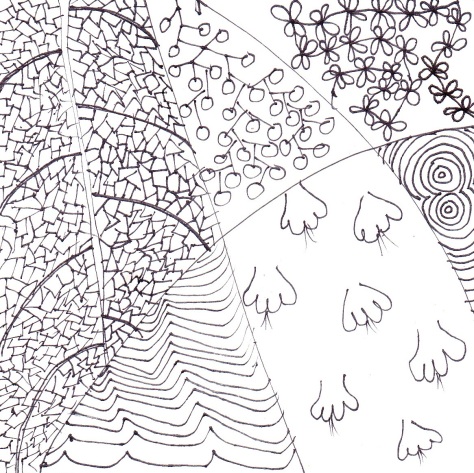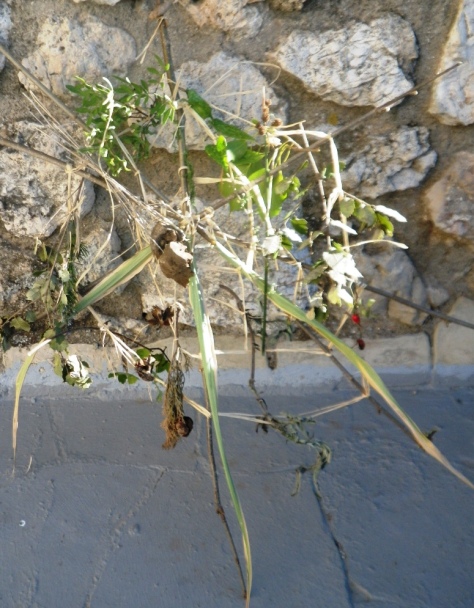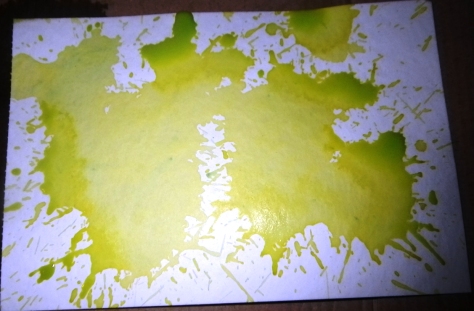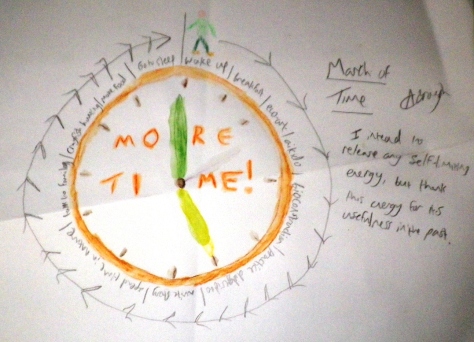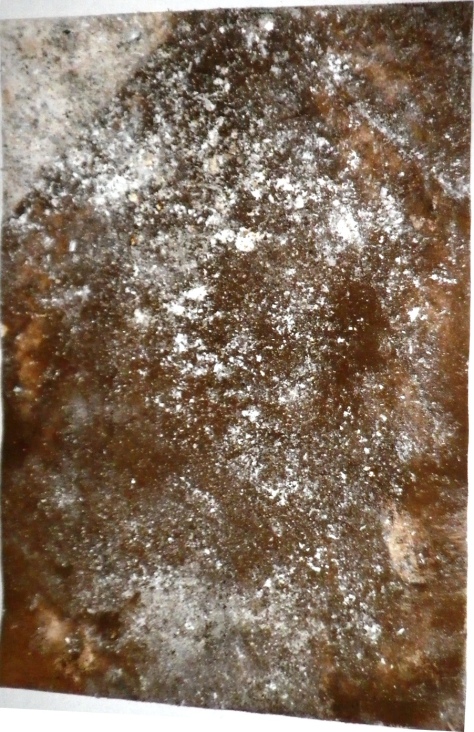An old tebba crawled low through the ruins on stilted legs, searching between the cracks and crevices for some juicy bugs to eat.
Grass was crushed beneath its clawed feet, and its carapace reflected the light of the two suns shining in the sky. At the edge of the ruins, something just as shiny appeared; it startled the tebba. With surprising agility it opened its carapace, stretched out its wings and flew away.
The thing that had scared the tebba away did not crawl low but stood upright on two legs. Hanging down by its sides were two limbs ending in manipulating implements, which were turning bits of rubble. It was Rovo 5, an android, built to observe and record the world around it. Within its circuits was stored a huge archive that contained the history of the city it was investigating, from its founding to its demise.
It observed every detail of the city’s ruins. It didn’t see just the ruins, but also a city full of life and light. Around it, alien races of all kinds went about their business, vehicles crawled, rolled and flew, and there were still tall buildings standing tall and proud. There was no hint that, one day, all this would be empty of life, and all the architecture would be reduced to rubble.
Rovo 5 continued down a road now overgrown with grass and bushes, projecting onto it the scene of a parade celebrating the city’s five hundredth year since its founding. It wasn’t a recorded image, but a reconstruction of the city’s life, created from all the data stored in Rovo 5. Fragments of relevant information were drawn together, and a whole experience was extrapolated from it.
Rovo 5 noted with irony that the memory of most sentient beings in the known universe worked like this – constructing memories from scratch. It wasn’t always accurate, but it was more economic than storing whole memories, one by one.
Rovo 5 did have a personality of sorts, gifting it with a sense of humour and a whole repertoire of simulated emotion. It didn’t need them, but it made it more endearing to its creators.There was no one to be endearing to now, but Rovo 5 felt it was important to keep track of emotional reactions too, as they would add another dimension to its observations that could inform it of the emotional reactions of its creators.
Melancholy and nostalgia were dominant, but also anticipation and excitement. Rovo 5 was on its way to a fountain where, its memories informed it, was said to be the founding of the city. There was no fountain there, just a pile of rubble covered with creepers. There was a constant trickle of water coming from it, hinting at the ancient spring that was hidden below it.
Rovo 5 reached back far in its memories to before the city’s existence. It was surprised to find itself in the middle of a desert with a small puddle before it. It looked around at the empty dunes, unsure of what it should be looking at. It didn’t have long to wait; over the top of a dune came a figure wrapped in fabric that protected it from the sun. The figure stumbled on its way to the water, stretched out its hand and stumbled forwards, collapsing face first into the puddle and just lying there.
Rovo 5 felt helpless not being able to help, just observing this figure drowning itself, but then the figure jerked its head up, spluttering and desperately clawing the rags off its face before plunging its face back down in the water to drink deeply.
Rovo 5 looked closely at the face and recognised it as a Stemp, with its scaly face sparsely covered with hair. Then Rovo 5 realised who it was – it was Xanderran, the legendary founder of the City. He had crossed the desert and found this spring, which later had a fountain built on it.
Xanderran rolled on his side and rested there. The suns were low in the sky, and the shade of the dune began to cover him. Over the dune, just where Xanderran had appeared, came a tebba, crawling along on its stilted legs, carrying on its back all of Xanderran’s provisions. It, too, headed straight to the puddle and sucked up as much as it could through its proboscis.
Xanderran stirred and looked at his pack animal.
“Well, Tebbit, we’ve found it. Can you see it? Here we plant our first crop, a huge crop!”
Tebbit just looked at him with uncomprehending compound eyes. It didn’t understand the words, but even if it had, it wouldn’t have understood how this place would have been good for crops. Rovo 5 certainly didn’t.
Xanderran shrugged. “We’ll rest here a little whileand then get back to the others. They’ll be so excited!”
Tebbitprobed around the ground with its proboscis, and it came into contact with a small, dark, green lump of mineral, which it sucked up. Almost immediately, the tebba’s body started trembling all over -Xanderran looked over at it, a bit concerned. A strange noise came from the tebba’s throat, as if it were clearing it, which elongated into a long buzzing sound.
Xanderran was very worried now, hoping that his pack animal would be okay. He’d never heard a sound like that come from a tebba before.
From within the buzzing, something like words began to form, “Zzzzesszzzgoozzzzzzzzcrrrropzzzzzz.”
“W…w…what?” Xanderran stuttered.
“Zzyes, goodzzcrropzz.”
“Huh?”
The tebba cleared its throat and tried again, “Yes, zzz good crop zzzz.”
Rovo 5 understood now: this wasn’t just the founding of the City, it was also the moment that the mineral bennif was discovered and the innate intelligence of the tebba’s was released, creating the new race of Tebbafeins. Tebbit stood more upright, and Xanderran looked at him, perplexed.
Rovo 5 turned its back on the scene, curious about what would happen next, and went up the dune following Xanderran’s tracks. It got to the top, but instead of seeing more desert, it saw a bustling market – his memory had leapt forward in time. Rovo 5 looked behind itself, now seeing the fountain where Xanderran had been.
The spring had been built on, and a system of canals spread out from it, keeping the fields irrigated. There were a few farm buildings and wells; people were working in the fields – Stemps, Tebbafeins and other races.It wasn’t quite a village, just a farm with a market attached that had risen because of the proximity of a trade route that passed close by – it connected the nearby bennif mines with the rest of the world.
Rovo 5 noticed a commotion by the market. A band of Tebbafeins had come from the mountains with a cart full of minerals. People were cheering and clapping their hands, or whatever appendages they had to bash together. These minerals were bennif, the same mineral that conferred on the tebbas their intelligence so they could rise from being mere pack animals to full members of their society.
Another band of Tebbafeins approached the first one, yelling and threatening them.
“Those are from our mine. That bennif is rightfully ours!”
A fight broke out between the two sides. The people around them stood back, making bets and cheering on one gang or another. Rovo 5 watched with fascination and some revulsion. How could civilisation develop from this?
The workers in the fields had stopped their work and were now walking towards the market to see what was happening. Leading them was a small female Stemp looking very angry.
She marched right up to them and started shouting, “How dare you disturb the peace of this place? Have I not been a good host to you? Have I not left you space to gather and trade?”
She spoke to her workers, who moved in and broke up the fight. The two gangs saw they were outnumbered and had no help from their crowd of supporters.
The Stemp again scolded them, “If this ever happens again, I will confiscate that cart of bennif. My ancestor founded this farm, and by his will, I decided who and what comes through here.”
By that simple proclamation, a law was put in place and the seed of the City’s politics was sown: conflicts in the market were referred to the owner of the farm.
Rovo 5 turned back to the present. The market had grown since then, and a whole commercial district had developed, but it was now nothing but rubble. The robot walked through the market’s remains to the other side, where it came across the trade route that had seen so many people come and go. It was the route through which all minerals in the mountains could be distributed around the world.
There were cracks and pot holes, and plants growing all over it. Some sections were lost under the forest. There had been buildings on both sides, which were now mostly gone. Rovo 5 walked along the road in the direction of the government building which lay a little way down the road. It was large, but not so large as to dominate the area. Opposite it there was the even more impressive palace that was once home to the Council of Representatives.
Once again, Rovo 5 delved into the archive to reconstruct a memory: the road itself was empty, though crowds of people lined both sides of it in anticipation. A Stemp appeared on the balcony of the government building, shouting and gesticulating at the representatives’ palace.
The crowd roared in laughter. Then, on the balcony opposite, a Tebbafein appeared shouting and gesticulating back, recreating the traditional enmity between the two institutions. The crowds laughed even more, clapping their hands.
The Stemp and Tebbafein were, respectively, the Chief of the Government and the Chief of Representatives. They both lifted small wind instruments to their mouths and sounded a note. Onto the street, from the buildings, came two opposing groups – government ministers and elected representatives. They faced each other in the middle of the road, armed with giant leaves. They waved their green weapons threateningly, growling and stomping, and then engaged with the enemy.
The crowds loved it, enthusiastically cheering at this reconstruction of the civil war. It was such an amateur attempt at reconstruction that it looked more like a group of clowns pulling and pushing each other, but with no real effort to hurt each other.
This carried on for a while until, along the road, came a procession of miners, a mixture of Stemps, Tebbafeins and other races, from the direction of the mountains. Their leader marched at their head with a book held above his head. He called for peace; the miners pushed apart the two opposing sides. The leader then ordered the two chiefs to come down to the road. Once they’d done that, the lead miner made them swear on this book he was holding. It was the Constitution, which had helped keep the peace for hundreds of years. The two chiefs shook hands and then marched with their “armies” down the road with the miners in the lead, waving at the crowds.
It was a celebration held every year by a civilisation that hadn’t known war or hardship within living memory and had no idea what was to come.
Rovo 5 shrugged, thinking that they were quite right to enjoy themselves while it lasted. It followed the procession down the road, enjoying the sense of participation as the crowds cheered all around.
Then the scene faded, and Rovo5 became aware of a sad sight: it was the park. It had been the pride and joy of the city, a place of beauty and companionship. There had been a beautiful variety of ecosystems – a forest, a lake, fields. But no more. It had become a place for the dead.
But its demise could be seen in how it responded to the city’s economy. Its ecology was diminished by the City becoming more focused on its mineral wealth in the mountains and its trade with the rest of the world.
Then the bennif mines failed, Tebbafeins returned to their primal state, the City began deteriorating, and so the park was abandoned more and more – it became a wild place where no one could enjoy nature. Lastly, a plague came, and finding no other space, the City dug huge pits and the park became a cemetery. No one wanted to visit.
Rovo 5 walked through the park, accompanied by sadness as it saw a huge machine opening a new grave. Rovo 5 was not feeling heartless enough to calculate the capacity for what they were digging.
A small group of people stood on a small hill, watching in despondent silenceand with eyes wide with grief. Their mouths were covered with masks, and all of them were wearing travelling capes – they weren’t stopping here.
Two Stemp sat the back were speaking in hushed tones.
“So, that’s it? The end of the City?”
“Yep, and we’re out of here. There’s nothing here now. No one.”
“Who’s in the digger, then? We can’t leave them here alone.”
“It’s one of those robots they brought in when the Tebbafeins went wild. They’ll be clearing the City out after us for some time.”
Rovo 5 looked out at the digger’s cabin, and sure enough, there was a robot just like itself. Perhaps it was looking at itself, though it couldn’t remember well.Then someone in the group signalled, and they all started down the hill, got into a bus-like vehicle and departed, leaving the City empty of inhabitants except for a few robots.
The scene faded, and Rovo 5 was confronted with the jungle the park had become, studded with a few mounds where the mass graves were.Rovo5 walked further into the park towards a very old building hidden in the forest. It was a dilapidated old shack, the door wide open and hanging off its hinges.
Rovo 5 stepped in and moved aside the rubble and boards on the floor to reveal a trapdoor. It lifted the trapdoor up and descended into the darkness, down a long ladder.It suddenly felt tired and was willing to rest. It reached the bottom of the ladder and started walking down a labyrinth of tunnels until it got to the end of one and entered through a door into a large chamber.Inside were big shelves full of the siblings of Rovo 5, all decommissioned and many half-cannibalised by other robots for spare parts. They had all been there when the last people had left, all working hard to deconstruct what was left of the City.When the work was done, they wandered, observing the history of the City and, one by one, going off line. Rovo 5 felt pride for its siblings. They were the last witnesses of a dying civilisation.
Rovo 5 stood in front of an empty space between two of its siblings and stepped into it, taking a moment to appreciate this moment – it was sad and tired, but so content at what it and its siblings had achieved. Then it initiated self-suspension, feeling with some solemnity each system shutting down, until finally Rovo 5’s awareness itself shut down and was no more.Rovo5’s task had ended, and now it was indefinitely turned off, not knowing if it would be switched back on by another civilisation.
